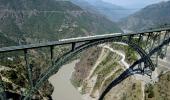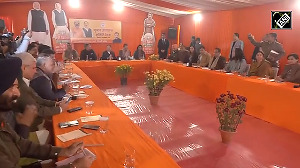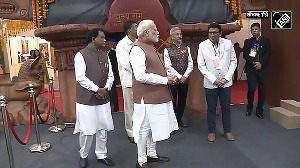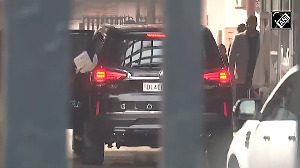
The semi-high speed Vande Bharat train will soon link Jammu with Srinagar, becoming the first train to connect the two capitals of the Union Territory through the Udhampur-Srinagar-Baramulla (USBRL) rail link -- which in turn will link the UT with national capital Delhi.
The train will cover the stretch between Jammu and Srinagar in three hours and 10 minutes.
"The commissioner of railway safety will complete their inspection of the Katra-Banihal section of the Udhampur-Srinagar-Baramulla Rail Link today. Once that is in place, we will be able to commission the line any time," a top government official said on Wednesday.
Once inaugurated, the train from Katra will leave at 8:10 in the morning and reach Srinagar at 11:20 am.
Most of the Katra-Banihal section is tunnels which have been constructed using the Himalayan tunneling method.
The Vande Bharat Express for this route has been customised to handle the freezing temperatures in the Valley, with silicone heating pads for water pipes and heating elements in windshield to ensure loco pilot visibility and safety of the train.

With the Chenab bridge and several other infrastructure links falling in Zone-5 with a high vulnerability to earthquakes, the construction of the bridges has been done using pre-loaded spring dampers, which absorb the impact of seismic activity on the bridge.
Similarly, a centralised tunnel control centre will monitor the 97 kilometres of tunnels in real-time, with monitors for tunnel health and seismic activity in place.
The government will also start work on developing Gati-Shakti cargo terminals across the rail line to boost economic activity in the Valley, the official said.
He also said that key issues between the ministry of railways and Russian rail manufacturer Transmashholding (TMH) -- operating in a joint venture with Indian PSU Rail Vikas Nigam (RVNL) called Kinet Railways -- over the contract for the manufacturing of 120 Vande Bharat trains have been resolved.

Late last year, the ministry had changed design specifications for its order of Vande Bharat trains, seeking to enlarge the size of the train from 16 to 24 coaches, with requirements of an additional toilet per coach, a pantry car, and other specifications.
These would have led to cost escalations, according to the Russian manufacturer leading the venture.
"The ministry has decided not to go forward with the requirement of a pantry car and the fourth toilet, which had been the major points of contention. Other issues will be resolved soon," the official said.
The JV will develop 120 Vande Bharat trains in Latur in Maharashtra at a cost of Rs 58,000 crore (Rs 580 billion), or Rs 120 crore (Rs 1.2 billion) per train.
PTI adds:
The Railway Board unveiled a Vande Bharat Express train, specially designed to operate seamlessly in Jammu and Kashmir's challenging winter conditions, for the upcoming Katra-Srinagar rail route.
Stationed at the Shakurbasti coaching depot in New Delhi, the train has special climate-related features, according to the Railways.
Describing its features to mediapersons, railway officials said the train has several additional features as compared to the other 136 Vande Bharat Express trains currently running in different parts of the country so that it can meet the operational challenges and passengers' amenities in extreme weather conditions of J-K.
"It has advance heating systems which prevent freezing of water tank and bio-toilet tanks, provide warm air for vacuum system as well as laboratories and ensures air-brake system functions optimally for smooth operations even in sub-zero temperatures," said Dileep Kumar, Executive Director (Information and Publicity) Railway Board.
"It has embedded heating elements in the windshield so that the driver's front lookout glass gets automatically defrosted ensuring clear visibility in hard winter conditions."
Board officials said that apart from climate-related features, it has all other amenities that the existing Vande Bharat trains have -- fully air-conditioned coaches, automatic plug doors, mobile charging sockets etc.





Photographs curated by Anant Salvi/Rediff.com
Feature Presentation: Rajesh Alva/Rediff.com












 © 2025 Rediff.com -
© 2025 Rediff.com -